Guest Post for Stratagems: Finding a Cause You Love
by Brian Saber
This post originally appeared in Jim Eskin’s monthly newsletter, Stratagems. In it he provides news, trends, and ideas about philanthropy, advocacy and image. If you haven’t, be sure to subscribe here. Jim has more than 30 years of leadership experience in institutional advancement, fundraising, public affairs, and communications.

It makes perfect sense that Brian Saber is President of Asking Matters — he has spent his entire career ASKING for money for non-profits. He highly recommends it, especially major gifts.
He notes that most of us don’t think of ourselves as actual “fundraisers” because we think it’s something sales-y that takes a big personality. So people entering the business gravitate toward events, grants, etc.
However, if he’s learned one thing over 30 years it’s that cultivating and asking individuals for gifts takes all kinds and what he thought would be his detriments turned out to be his biggest strengths.
“I’m introverted and shy. I truly get anxious at the thought of meeting anyone new. In fact, my policy is to never introduce myself to anyone if I can avoid it. Doesn’t sound like a fundraiser, does it?” Yet once you get over that hump, Brian points out that you will really enjoy getting to know people individually. And as an introvert Brian tends to talk less and listen more, which is key to fundraising.
Final advice: Don’t worry about who you think you are. Focus more on finding a cause you love. When you do, you’ll be able to apply your skill set brilliantly to whatever role becomes your calling — even major gifts!
Guest Post for fitRaise: You’ve Got Lots of Donors – Now What?!
by Brian Saber
This post originally appeared on fitRaise.com. The fitRaise platform enables individuals, groups, and organizations of all sizes to host worldwide events to raise money to support important causes. Start your own campaign today with zero up-front costs.
Crowdfunding is creating legions of excited new donors. It’s never been easier to reach out to a host of people at minimal cost and solicit gifts for your organization.
Just as with direct mail, phonathons, and other broad-based fundraising appeals, the key is figuring out which of these donors might become your long-term, major gift donors. How do you get them to continue giving and how do you get them to increase their giving over time?
In a word, cultivation is the key. Cultivation means treating each of your donors as an individual. It’s figuring out what motivated a donor’s initial gift, what type of communication and involvement would engage that donor further, and how your donor makes charitable decisions.
That’s not so easy when you have lots of new donors and don’t know much about them. Now you need to find out which donors are the best prospects for the future. You’ve got to winnow down the list, because if you try to cultivate everyone, you’ll end up cultivating no one.
Here are five ways to identify and cultivate your best long-term prospects:
- Start communicating with your new donors immediately and see which ones open your emails regularly.
- Ask for input and feedback, engaging in a dialog with donors who offer their thoughts.
- Personalize communication with donors as much as possible. Everyone wants to be recognized as an individual.
- Offer opportunities to be directly involved in helping your organization. Those who give their time are more likely to also give their money.
- Ask them to give again for another project or on the anniversary of their last gift and track who responds. It’s much easier to renew a gift than find a new one, and those who give consistently are hand raisers.
As you learn about your donors and interact with them, begin to develop a major gift tracker. How many donors can you manage? Remember, you can’t cultivate everyone. Perhaps it’s 25 or 50?
Don’t overthink the tracker. What’s most important is the “next step” – what will you do next to engage a particular donor…and who is responsible for it? If you have a simple chart with that information alone it will take you far.
Need an example? Click here to download the Asking Matters Prospect Tracker. It works off an Excel spreadsheet similar to those I’ve used my entire career.
Are you ready to get started? Just take it one step at a time and keep it manageable.
The rest will flow from there.
I just went through the hideous experience of buying a new car. Nothing short of mine becoming unsafe to drive could have gotten me back into a car showroom. But with warning lights coming on constantly, the brake system continuing to be problematic after much work (and money), and a strange grinding beneath my feet, I felt my luck might soon run out and I’d find myself wrapped around a pole.
Those of us in the fundraising world know we’re not in sales, yet everyone outside our world seems to think that’s what we’re about, to our detriment. It only took one visit to a car showroom to underscore the difference. . . and to make me wonder how anyone could possibly think these two worlds were even remotely aligned.
Be sure to watch my brief video below, “Think Relational”, to learn more about how to build your relationships with donors, instead of thinking about fundraising as a transactional process.
The first sign that the car salesman and I saw the world differently was all his talk about repeat customers. The more he talked about them the less I believed they had them. It made me think about outcomes measurements. He certainly wasn’t going to convince me without data, which, by the way, he didn’t have. Can you imagine in our business trying to convince people to contribute to our cause because we have a track record of repeat business – donors who continue to give year after year?
The second sign was the negotiation. I can’t imagine my main goal being to make the process as opaque as possible so my donor has no understanding why the price on the table makes sense. The price on the table was simply the most gouging price he could offer up, a price paid by those who abhor negotiation or are easily flattered – or can’t add. 
The third sign was no real desire to get to know me. Why do that when you’ll never see me again after I buy a car or walk out and buy elsewhere? In lieu of getting to know me, my salesman was simply looking for my weak spot. How could he wear me down? What would it take to get this one yes, even if I’d never buy as much as a cup of coffee from him again?
I walked out of there with a car, but also thinking I probably got snookered again. It didn’t make me feel particularly good, though at least I had my new car which I’m enjoying driving. If one of my donors ever walked out of a meeting feeling like I did, I certainly wouldn’t have done my job.
So the next time anyone dares to mention “sales” and “fundraising” in one sentence, tell them I’ve got an amazing used car to sell them that runs like a dream.
Donors Aren’t One-Night Stands!
by Brian Saber
What percentage of your major gift donors make only one gift, then stop giving?
Click your answer below to see the results!
OK. Sometimes they end up being one-night stands, but we shouldn’t be out there looking for them.
One-night stands are exciting. A well-meaning volunteer sets you up. The prospect meets with you as a favor to your volunteer. Maybe arm-twisting or favor trading is involved.
You’re eager so you do your homework. You put on your sharpest outfit. You come to the meeting ready to make your best effort. In the back of your mind you know the first time is also probably the last.
You get the adrenaline rush. You ask for the gift. If you get it, what a thrill!
Time to find another prospect to give you that rush again. Eventually the pickings get slim. And it turns out you’ve spent a lot of time having one-night stands and none of those donors has developed a lasting relationship with your organization.
It doesn’t sound like a formula for success, and it’s not. At the end of the day, no meeting is primarily about the gift. Every meeting has to be about building a relationship, because virtually no gift is worthwhile in isolation.
Individual donors are best because they don’t like one-night stands any more than you do. The one-off gifts individuals make are rarely as satisfying as those they make to organizations they have come to know and admire. And once they have formed a relationship, they want to build on it just as you do. Your job is to value the relationship and think of ways to deepen it. How can you best do that?
So the next time someone wants to set you up on a one-night stand, tell them it’s not worth your time and ask them to find someone with whom your organization can have a long, meaningful relationship!
Fellow Introverts – You Rock!
by Brian Saber
56% of all Asking Style Assessment takers get Primary Asking Style results of Kindred Spirit or Mission Controller, the introverted Styles. Yet everyone thinks of extroverts when they think of fundraisers. What’s going on here?
At the core, there’s a huge misconception about what makes a great fundraiser. No question, extroverts have important traits. They are comfortable meeting and engaging new people and they derive their energy from being with people and seek them out. This takes them far.
Yet that comfort and energy can lead extroverts to talk too much, and we all know that the key to building a relationship is listening – not talking. This is where introverts shine. We’re wired to talk less and listen more, so we give our donors more opportunity to ask questions, share their viewpoint, and talk themselves into a gift.
As Jerry Panas would say, “no fundraiser ever listened themself out of a gift.”
Find your Asking Style
The largest donations come from face to face asking… that’s why we developed the Asking Style Assessment. We believe you can use your personality to help you be more comfortable and confident when you ask for donations. Curious to know your Asking Style? Take the assessment for free!
“I Won’t Give You Anything – Ever!”
by Brian Saber
What constitutes a “no” and when does “no” mean “never”?
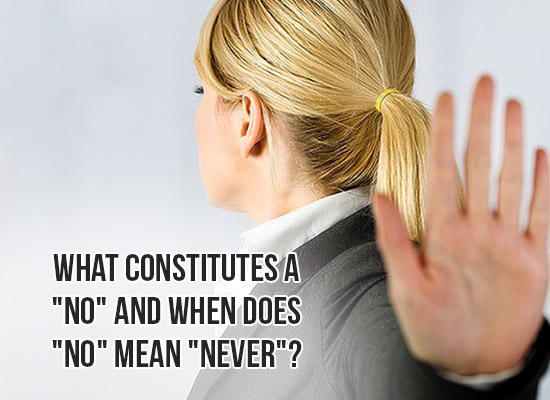 After the great enigma of determining what to ask for, figuring out when to stop asking must be the next greatest enigma. Do we stop if our donors don’t call us back? If they tell us they won’t give this year? If they say they are supporting other causes? What constitutes a flat-out, permanent “no”?!
After the great enigma of determining what to ask for, figuring out when to stop asking must be the next greatest enigma. Do we stop if our donors don’t call us back? If they tell us they won’t give this year? If they say they are supporting other causes? What constitutes a flat-out, permanent “no”?!
My golden rule is to never assume I know what the donor is thinking. We know the old adage about assuming, and while it won’t necessarily make us asses in this case, it will keep us from getting at the truth and maximizing giving.
I start from the premise we’re all adults here, and we understand the rules of engagement; open communication, honesty, and mutual respect. Within that context, I believe donors have a moral obligation to respond openly and honestly. And we have to take what they say at face value.
Need advice dealing with tough donors? Watch the Asking Matters video training, Maybe? No? – How to Respond, where you’ll dive deep into these common responses. This is the time to ask questions and to provide direction and support that will help the donor commit to a gift.
No Return Call, Email, or Text
This is an easy one for me. If I’m in the middle of a gift negotiation and someone has either met with me or said they’d like to meet with me, I do not stop contacting the donor until the donor tells me to. This is a conversation, no different from an in-person conversation. In person, donors wouldn’t sit there blank faced, just because I’ve sent an email or left a phone message doesn’t negate the obligation to respond.
First I leave messages or send emails (I’m not a text user for donor communication yet!) at one- or two-week intervals, depending on the case. After two or three of these, I might take a short break and try again. Eventually, I will communicate how I don’t want to assume anything, but I thought the donor was interested, and that I’d be grateful if the donor would let me know where he or she stands. If I still can’t get anywhere, I might ask a volunteer who knows the donor to make contact.
Invariably, I get an apology and an excuse about how busy the donor’s been. To some extent, it reminds me that although the donor’s gift is high on my priority list, that gift is much lower on their list.
However, it also reminds me that everyone doesn’t share my code of conduct, and everyone doesn’t respect people equally who they perceive to be in a subjugated position. Rather than let this bother me, I see it as a reflection on the donor’s behavior and remind myself it’s not about me (as a Kindred Spirit I often need that reminder!).
Bottom line, no response is not a response.
Take Them at Their Word
We’ve got to believe what our donors tell us.
If they tell us “not now,” then we have to thank them and, at the same time, ask when we can come back. Perhaps they’re trying to be polite, but we can’t and shouldn’t assume that. We need to ask questions that will help them give us complete and accurate answers.
“May we come back at another time? Might you consider a gift six months from now? Next year? Can you help guide us? What would influence your decision to give?”
If they tell us they have to think about it, then that’s exactly what we must believe they need to do.
“Thank you for considering a gift. May I contact you again in two weeks to follow up? Or when would you like me to contact you? What other information would be helpful to you in making your decision?”
If they tell us they’re supporting too many other charities already…
“How wonderful that you’re so charitable. Can you add us to your charitable roster in the future? Might we come back next year or in two years? And may we engage you in the meantime?”
If the project doesn’t interest them…
“Thank you for sharing that with me. What programs of our organization do you find most compelling? What resonates for you?
My Rule of Thumb
For me, nothing short of “I will never make a gift of any amount for any project at any time” deters me. If a donor doesn’t tell me this in some clear fashion (or tell a third party to tell me that!), I will persevere. That’s my job.
I also believe that when we’re persistent, we send the message that our donors’ gifts are important. Donors want to feel their gifts matter. If we try hard to secure them, we underscore the value of those gifts. When we walk away we send the wrong message.
None of this is easy. As a Kindred Spirit I’m conflict averse, so having to reach out to donors multiple times, negotiate with them in meetings, and ask pointed questions pushes my buttons. But they’re my buttons, and that means reminding myself why I care, why my organization is so important, and that this isn’t about me.
I’m just the messenger. And if I reach out and persist until I get a clear answer, I’m being the best messenger I can be.
Here’s to finding your voice and funding your vision.
Why Doesn’t Your Board Give Personally Significant Gifts?
by Brian Saber
Does at least 75% of your board give personally significant gifts? Take our quiz to find out how you compare to other fundraisers!
What percentage of your board gives personally significant gifts?
In the course of working with fundraisers representing thousands of organizations, two things are clear.
- Board members often don’t know what’s expected
- Most board members are not treated like donors
 You’ll never get anywhere if this is the case.
You’ll never get anywhere if this is the case.
It starts with that first meet and greet. You’ve got a “hot” prospect for the board and you’re immediately thinking you’ll do anything to get this person to join. Wrong! Stop right there. It’s a privilege to serve and you only want board members who are passionate about joining. If they’re doing you and the organization a favor, it can only go south. Who would give a personally significant gift on top of doing someone a favor?
Let’s assume they’re passionately interested. Make sure they know what’s expected up front. If your don’t set their sights high from the get go, you’ll have to work triply hard to raise their sights later. Perhaps you have a minimum threshold. My strong preference is to ask for a personally significant gift.
So now you’ve got board members who understand they’re expected to give personally significant gifts. How do you get those gifts? You solicit your board members as you would any other major donor: individually, face-to-face, with as much peer involvement as possible.
Why do so many organizations have board chairs make a pitch at a board meeting and then send around pledge cards? Or send board members home with forms to fill out on their own? Would you make a group pitch to all your other major donors? Or send them home with forms so they can decide on their own? Nope. You’d determine an ask amount, sit down face-to-face, and ask for that amount.
Board members are donors too! Please don’t forget it!
What’s been your experience building friendships with donors?
Click your answer below to see the results!
We’ve all been there. We’ve gotten to know a donor over time. We’ve learned so much about her and we’ve shared much about our life as well. We’ve had some cultivation and solicitation meals. We’ve met the family. We’ve written personal notes.
Let’s assume we really like this donor and there’s a natural bond forming. We can truly see ourselves having a friendship. But is what we’re seeing real? And are we seeing what the donor is seeing?
Authenticity
Authenticity is key to building relationships. I always teach that you must be yourself and not try to be what you think your donor wants you to be. However, being yourself with a donor isn’t the same thing as being yourself with a friend.
 Would you really tell a donor that she should tip the waiter more? Or stop being a curmudgeon (I tell a good friend of mine that all the time!). Or that she might want to revisit her decision about getting a dog? Probably not.
Would you really tell a donor that she should tip the waiter more? Or stop being a curmudgeon (I tell a good friend of mine that all the time!). Or that she might want to revisit her decision about getting a dog? Probably not.
Obviously we have many types of friends. And perhaps we wouldn’t tell all our friends that they’re being cheap or curmudgeon-like. Some of us (not I!) filter what we say for a variety of reasons.
But if you know that your donor holds certain political views, would you share that your views are the opposite? Be honest. And I’m not talking about polar opposites, in which case you might not want to be friends. But wouldn’t you perhaps hold back that information with a donor even though you’d share it with all your other friends?
And if you’re holding back information you’d share with all your friends, are you being an authentic friend? Would your donor, as your friend, want you to do that? I think not.
The Professional Piece
It gets even trickier. Once you’re personal friends with your donor, can you still solicit her effectively? I recently solicited a donor friend, and I remain concerned that she increased her gift in part to support my work. As a fundraiser I should want her to give because she cares and believes in the project and the organization. Can I still present the organization effectively and close a gift based on that premise?
Or what happens when you get to know your donor friend well and find out that she and her husband are sitting on a veritable fortune? Did she share that with you because you’re a friend, in which case you can’t factor that information into the size gift you solicit? So now you’ve got important information you need to keep from your boss.
And let’s not forget your employment might not end well. Even assuming it’s nothing more than your getting an amazing offer to work elsewhere, yet it’s come early in your tenure. You take it, which leaves the organization in the lurch. Your boss is very unhappy about this and your departure is tinged with some bad feelings. Where does that leave your donor? How does she bridge that divide? Where are her loyalties?
What to Do?!
 None of this is to say that you should never become friends with a donor. It’s as unrealistic as not becoming friends with your boss or anyone else with whom you share a different relationship. Many of your dearest relationships will come from the bonds you develop through your work. It makes sense given the tremendous time you spend working throughout your life.
None of this is to say that you should never become friends with a donor. It’s as unrealistic as not becoming friends with your boss or anyone else with whom you share a different relationship. Many of your dearest relationships will come from the bonds you develop through your work. It makes sense given the tremendous time you spend working throughout your life.
Yet, it’s important to be hyper-aware of the dynamics of relationships with donor friends and the various potential challenges and pitfalls that can arise. It’s important to understand that first and foremost you have a job. You have an obligation to do that job to the best of your ability and not let personal issues interfere with that work. Can you do that? Can you be friends with a donor and still put your job first?
From experience, that only happens once in a blue moon. I can count on one hand the number of true friends I’ve established over 30 years. Those friendships have taken constant monitoring to ensure I’m being a loyal employee and a true friend at the same time.
How about you? Are you friends with donors? How have you managed that? I’d love to hear from you.
find us on social media
connect with asking matters on facebook, twitter, and linkedin for more fundraising advice, news, and important updates!
Don’t Assume… Ask!
by Brian Saber
How many times have you been in meetings with circular discussions about whether it’s time to ask a prospect for a gift?
- Fundraiser #1: I don’t think Barb and Jerry will want to meet because…
- Fundraiser #2: But Rachel said she ran into Barb at the club and they had a nice discussion…
- Fundraiser #3: They’ve got three kids in private school so they’re spending a lot now…
- Fundraiser #1: Right, and that means that they have capacity, so we should ask…
- Fundraiser #2: I wouldn’t want to turn them off since they have such great capacity and are friends with Diane and Stuart…
- Fundraiser #3: They shouldn’t be upset with us because…
Stop Assuming! You will never come up with the perfect answer because there’s no way to know the perfect answer without asking the question:
 “Barb and Jerry, may we come visit with you to talk about a gift to the Spokane Community Center? Of course we know you’ve got a couple of kids in school and that’s a big load, but we know you’ve always been generous to the Center and your support would help us make a huge impact here. While we’re together we can also update you on all the wonderful expanded programs we have in place for children and teens.”
“Barb and Jerry, may we come visit with you to talk about a gift to the Spokane Community Center? Of course we know you’ve got a couple of kids in school and that’s a big load, but we know you’ve always been generous to the Center and your support would help us make a huge impact here. While we’re together we can also update you on all the wonderful expanded programs we have in place for children and teens.”
Figuring out whether a prospect will meet is only one of the many questions we can debate forever or simply ask our prospect:
- What interests you most about Spokane Community Center?
- How do you decide which charities to support? What’s most important to you?
- How often would you like to hear from us?
- Is there something about our Center, or the field in general, that you’ve always wanted to know?
- Do you consider multiple gifts to an organization? If we had special projects or special events, would you consider supporting those as well?
- May we come visit with you every year as we’ve done today? Would you like us to visit more often?
Why do you hesitate at all to ask these questions? Do you feel like you’re prying? Or are you concerned about upsetting someone with a question?
If so, ask yourself, would any of these questions upset you? Would you, as a prospect, be offended by these questions? Or would you be pleased that the organization wants to get to know you? I have always found – and that’s after thousands of asks! – that if asked graciously and respectfully, almost any question is within bounds.
Let’s not forget, most people enjoy being asked about themselves. It enables them to feel heard and to feel important. We should never forget that our donors want a relationship with their charities as much as we want relationships with them. They might not know what that relationship should look like, but people don’t want to give away money, they want to make an impact in the world. The deeper their relationship with an organization, the more they’ll come to understand the impact they’re making.
So, the next time you are having a circular discussion about a prospect don’t assume… ask! You’ll be amazed at what you can learn.
Here’s to finding your voice and funding your passion.
What I Learned From the Master: Jerry Panas
by Brian Saber
It was an honor and a treat to interview Jerry Panas this week for my Fundraising Masters Series.
If ever there were a master, it’s Jerry. The fact that more than 900 people signed up to attend the webinar is testament to Jerry’s lead position in the field of fundraising.
The interview was prompted by Jerry’s publishing The Lost Manuscript, a compilation of wonderful memoranda written in the 1950s by Si Seymour, Jerry’s mentor and one of the first professional fundraisers in the field.
Here are the Top 10 things I learned or had reinforced:
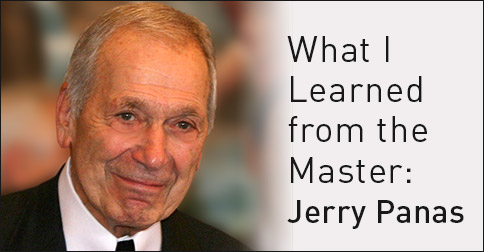 1. Si Seymour was the original fundraising master. I have to admit I didn’t know anything about him. Now I’ve not only read The Lost Transcript but Designs for Fund-Raising, Si Seymour’s seminal book in the field.
1. Si Seymour was the original fundraising master. I have to admit I didn’t know anything about him. Now I’ve not only read The Lost Transcript but Designs for Fund-Raising, Si Seymour’s seminal book in the field.
2. With all the “new” ideas in fundraising, so many of the core concepts are timeless: cultivation, involving volunteers to open doors, the importance of meeting in person, and more.
3. 95/5 is the new 80/20. Jerry is seeing the top 5% of donors giving 95% of the gifts, meaning even more focus cultivating the very top tier of donors.
4. Even Jerry “agonizes” over making the call to set up the appointment, so none of us should feel bad about it but we all have to push through by remembering why we care and how important and transformative our work is.
5. ASKING is still the book in the field. Everything about it is relevant. And it’s funny besides – look for the proctologist analogy and tell me that doesn’t make you laugh!
6. Jerry confirmed what many of us know – that asking for the gift often happens during the first meeting. The ideal generally involves at least one cultivation meeting first, but that can’t always happen and isn’t always preferable anyway. The bigger problem is continued cultivation without asking or, as Jerry puts it, “Ready, aim, aim, aim, aim…but no fire!”
7. Si Seymour identified a persistent problem in the field – too much focus on “need” and not enough on “relevance, importance, and urgency.” We must remember to focus on impacts and vision.
8. The stereotypical fundraiser – outgoing and assertive – is not always the best fundraiser. Often those who are quieter are better listeners, and that’s the number one skill needed.
9. Always ask for an exact amount. No ranges! They signify you don’t know much about the donor
10. Don’t ask, don’t get!
Missed the interview? Listen to it in its entirety here.


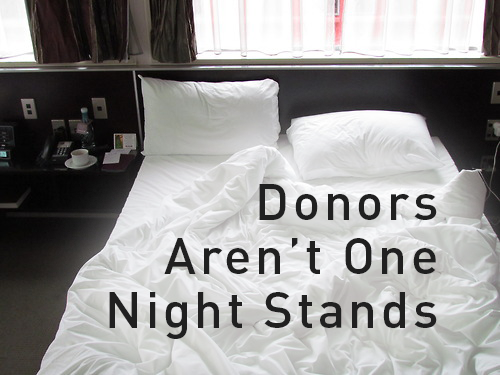
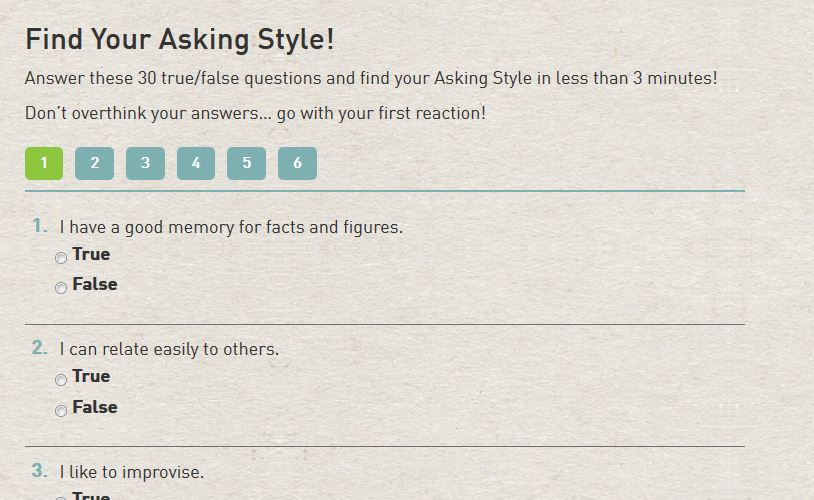


 like us on facebook
like us on facebook follow us on twitter
follow us on twitter connect on linkedin
connect on linkedin